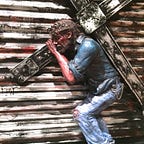Building Bridges of Hope: Reflection on a Synodal Encounter with Pope Francis
By Channing Lee
At the end of January, I received an unusual email in my inbox. The subject line read: “Opportunity to participate in Zoom meeting with Pope Francis!” I rubbed my eyes. Did that say what I hoped it said?
If indeed it was true, I could not help but cry out in disbelief. Sure, I am heavily involved in campus ministry at Georgetown as a student director and pianist for music ministry. Through my academic studies in religion, ethics, and world affairs, I have reconciled my passions for international relations and religious dialogue throughout my undergraduate years. My experience writing a book about faith buttressed my understanding of how everyday people interact with their faith journeys, and my recent participation in the Global Citizenship Fellowship with the International Association of Jesuit Universities (IAJU) has introduced me to faith-filled perspectives from all over the world.
But universities are brimming with talented students from a plethora of diverse backgrounds and experiences. Of all the students at my Jesuit university, and the entire Western Hemisphere, how was I so lucky as to be among the chosen for this opportunity?
As Pope Francis would later say at our Feb. 24 synodal encounter, “Hope does not deceive. If it is true hope, it does not deceive.”
It was true — the pope was opening his heart to listen to the voices of university students like myself. In an event titled Building Bridges North-South: A Synodal Encounter between Pope Francis and University Students, young people from North, Central, and South Americas came together to discuss thoughts about migration. It was amazing to witness my peers present to the Pope our prepared ideas — some of which were my very own!–-and even more incredible to hear His Holiness respond to us by name.
At the historic meeting, we college students raised two main issues with Pope Francis: 1) individual migrants face many barriers trying to assimilate and 2) countries from where migrants are fleeing need assistance. In other words, since most countries in the Western Hemisphere have been either receivers or originators of migrants, both parties — all of us — can use some help.
Despite having met multiple times with my East Coast group from the U.S. and Canada, it was not until our final meeting with counterparts from South America that I realized my perception of migration was only one of many. In our cohort, we discussed how our communities could better serve migrants who were arriving with limited resources, language skills, and senses of belonging. In my particular small group, we brainstormed ways parishes could create networks and databases of volunteers who could assist migrants as they created new lives in their new homes, especially with language services. When our peers from South America shared their aspirations–tools for economic development, advancement of sustainable energy options, and policy discussions with corporations to preserve their lands from exploitation–I suddenly grasped how widely our two conceptions of migration diverged.
Indeed, during the February 24th encounter, students from the U.S. and Canada drew on church doctrine, Catholic Social Teaching, and even the words of Pope Francis himself to encourage awareness raising and support for migrants. Yet students from Brazil, Mexico, and South America raised concerns about violence, poverty, and systemic injustice in their countries, asking for advice on cooperating with their local churches to address these issues. The Pope responded with wisdom and grace, acknowledging our statements and concluding that everyone must discuss the topic of migration because it is a universal challenge.
As I alluded to in an interview with the National Catholic Reporter, the Pope’s willingness to meet with us is cause for hope that the Church is transforming. With initiatives like these, the Catholic Church can truly be not only a church for the poor, but also a church of all its people, incorporating the voices of students like me in its decision-making. Through this process, I have felt empowered to advocate for solutions to the problems facing our society and even made new friends in the process.
Less than 24 hours before our synodal encounter, another migration crisis began unfolding across the globe — Ukranians young and old found themselves in the middle of an unjustified invasion, many packing their bags to flee their homes. Now, more than ever, we must empathize with migrants and their experiences because they are our neighbors — and they could be us.
With a leader like Pope Francis willing to engage with young people, some of whom have experienced migration themselves, I feel hopeful that the Church is moving us forward. As His Holiness said himself, “Building bridges is part of our vocation.”
Channing Lee studies International Politics at the Edmund A. Walsh School of Foreign Service at Georgetown University. She is the author of Stronger Than Trust: Igniting the Faith Within Us.
